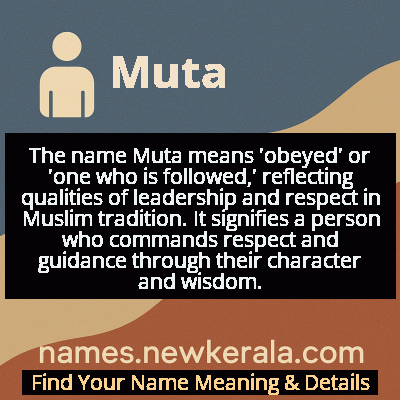Muta Name Meaning & Details
Origin, Popularity, Numerology Analysis & Name Meaning of Muta
Discover the origin, meaning, and cultural significance of the name MUTA. Delve into its historical roots and explore the lasting impact it has had on communities and traditions.
Name
Muta
Gender
Male
Origin
Muslim
Lucky Number
1
Meaning of the Name - Muta
The name Muta means 'obeyed' or 'one who is followed,' reflecting qualities of leadership and respect in Muslim tradition. It signifies a person who commands respect and guidance through their character and wisdom.
Muta - Complete Numerology Analysis
Your Numerology Number
Based on Pythagorean Numerology System
Ruling Planet
Sun
Positive Nature
Leaders, ambitious, highly driven, self-reliant, innovative.
Negative Traits
Overly aggressive, domineering, impatient, selfish.
Lucky Colours
Red, orange, gold.
Lucky Days
Sunday.
Lucky Stones
Ruby, garnet.
Harmony Numbers
2, 3, 9.
Best Suited Professions
Entrepreneurs, managers, engineers.
What People Like About You
Courage, determination, leadership.
Famous People Named Muta
Muta ibn al-Nu'man
Military Commander
Early Islamic military leader who participated in the Battle of Mu'tah and early Muslim conquests
Muta al-Sudani
Religious Scholar
Islamic scholar known for his contributions to early Islamic jurisprudence in Sudan
Muta al-Harithi
Tribal Leader
Influential tribal leader in the Arabian Peninsula known for his leadership and diplomatic skills
Muta al-Misri
Poet
Egyptian poet known for blending traditional Islamic themes with modern poetic forms
Name Variations & International Equivalents
Click on blue names to explore their detailed meanings. Gray names with will be available soon.
Cultural & Historical Significance
In Muslim societies, names carrying meanings related to obedience and leadership are highly valued as they reflect desirable qualities in both religious and community contexts. The name Muta embodies the concept of being someone whom others willingly follow and respect, making it a meaningful choice for parents seeking to instill leadership qualities in their sons. Throughout Islamic history, individuals bearing this name have often been associated with positions of responsibility and trust within their communities.
The name also connects to broader Islamic values of community cohesion and structured leadership, where obedience to righteous authority is considered a virtue. This cultural significance extends beyond mere naming conventions to reflect deeper social and religious ideals about the relationship between leaders and their communities in Islamic tradition.
Extended Personality Analysis
Individuals named Muta are typically perceived as natural leaders with a strong sense of responsibility and authority. They often exhibit calm, decisive personalities and possess the ability to command respect through their actions rather than demands. Their name meaning 'obeyed' tends to manifest in their character as people who naturally attract followers and can effectively guide others.
Mutas are generally known for their reliability and trustworthiness, making them excellent in positions requiring judgment and decision-making. They tend to be protective of those under their care and demonstrate loyalty to their principles and communities. While they can be firm in their convictions, they typically balance this with wisdom and consideration for others' perspectives, creating a leadership style that inspires genuine respect rather than mere compliance.
These personality traits often make Mutas successful in roles that require mediation, guidance, and community leadership. They tend to approach challenges with practical wisdom and are often sought out for advice and direction. Their natural authority is typically tempered with compassion, creating a balanced leadership approach that earns them lasting respect from those around them.
Modern Usage & Popularity
In contemporary times, the name Muta maintains steady usage within Muslim communities worldwide, particularly in Arab countries and regions with significant Muslim populations. While not among the most common names, it continues to be chosen by parents who value its strong meaning and historical significance. The name has seen consistent but moderate usage over recent decades, with some resurgence in popularity among families seeking traditional yet distinctive names. It remains more prevalent in conservative Muslim communities where names with clear Islamic meanings are preferred over modern or Western-influenced names. The name's usage patterns show it maintains cultural relevance while avoiding the trends of extreme popularity that affect many contemporary names.
Symbolic & Spiritual Meanings
Symbolically, Muta represents the ideal of voluntary obedience and respected leadership. It embodies the concept of authority earned through wisdom, character, and trustworthiness rather than coercion. The name carries connotations of reliability, guidance, and moral strength, suggesting someone who serves as a pillar of their community. Metaphorically, it represents the bridge between command and consent, where leadership is exercised with responsibility and followers give their allegiance willingly. This symbolic meaning aligns with Islamic principles of just leadership and mutual respect between leaders and their communities, making the name a powerful representation of ideal social and religious relationships.

